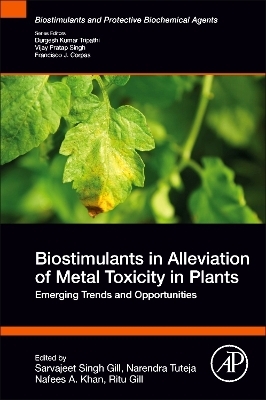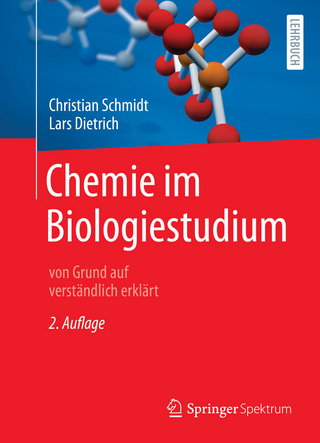
Biostimulants in Alleviation of Metal Toxicity in Plants
Academic Press Inc (Verlag)
978-0-323-99600-6 (ISBN)
Once inside a plant system, toxic metals may initiate a variety of physiological alterations in plants, including adversely impacted seed germination, root and shoot growth, chloroplasts ultrastructure and photosynthesis, nutrients assimilation, carbohydrates metabolism, and plant hormonal status which, collectively, results in reduced plants yields. In addition to several naturally occurring physiological and metabolic re-programing responses, plants may also modify their root and shoot systems in order to dilute entered amount of toxic metals. As an additional tool biostimulants have emerged as one of the important plant protectors under adverse conditions.
Dr. Sarvajeet Singh Gill is an Assistant Professor at Centre for Biotechnology, Maharshi Dayanand University, Rohtak. His research focus includes Agricultural Plant Biotechnology; Biotic & Abiotic stress biology, plant microbe interaction and in-silico understanding of plant genomes. In addition to his research and teaching responsibilities he has served as Associate Editor for the Brazilian Journal of Botany, and as Guest Editor of Plant Genes. He was Guest Editor of BioMed Research International’s Special Issue (Plant Stress & Biotechnology); Frontiers in Plant Science, Section-Environmental Toxicology (Topic Title: Phytotoxicity of high and low levels of plant-beneficial heavy metal ions); Frontiers in Plant Science, Section-Crop Science and Horticulture (Topic Title: The Brassicaceae - agri-horticultural and environmental perspectives); Frontiers in Plant Science, Section-Plant Physiology (Topic Title: Recent insights into the double role of hydrogen peroxide in plants); and Functional Genomics Approaches to Decipher Plant Resilience to Environmental Stresses (International Journal of Plant Genomics). An elected fellow of numerous national and international academies, Dr. Narendra Tuteja is currently Professor and head at Amity Institute of Microbial Technology, NOIDA, India, and visiting Scientist at International Centre for Genetic Engineering & Biotechnology (ICGEB), New Delhi, India. He has made significant contributions to crop improvement under adverse conditions, reporting the first helicase from plant and human cells and demonstrating new roles of Ku autoantigen, nucleolin and eIF4A as DNA helicases. Furthermore, he discovered novel functions of helicases, G-proteins, CBL-CIPK and LecRLK in plant stress tolerance, and PLC and MAP-kinase as effectors for Ga and Gß G-proteins. Narendra Tuteja also reported several high salinity stress tolerant genes from plants and fungi and developed salt/drought tolerant plants. Prof. Nafees A. Khan research focuses on understanding the mechanisms of hormonal and nutritional regulation of plant growth with special emphasis on abiotic stress vis-a-vis photosynthetic efficiency and abiotic stress tolerance. He has received multiple recognitions of his work including recognition as a top scientist in a study conducted by Stanford University and published in Plos Journal He is highly cited and received a UGC Mid-Career Award in 2018. Dr. Ritu Gill is an Assistant Professor at Centre for Biotechnology, Maharshi Dayanand University, Rohtak since March, 2010. Prior to joining MDU, he worked as researcher at Structural Biology Group, International Centre for Genetic Engineering & Biotechnology (ICGEB), New Delhi. Dr. Gill did his M.Sc in 2003 with distinction and completed Ph.D. from DRDE, Gwalior, India in 2007 with significant research publications. Her research areas include Computational Biology; Antimicrobials for Malaria research; Abiotic stress biology, plant microbe interaction and in-silico understanding of plant genomes. Dr. Gill has quality publication in the journals of International repute and also edited books with International Publishers.
1. Biostimulants: An Introduction
2. Sources of endogenous biostimulants in plants
3. Role of Biostimulants in plant’s life cycle
4. Biostimulants homeostasis in plants
5. Implication of endogenous biostimulants in regulating Cd toxicity
6. Implication of endogenous biostimulants in regulating As toxicity
7. Implication of endogenous biostimulants in regulating Al toxicity
8. Exogenous application of biostimulants and Cd stress tolerance
9. Exogenous application of biostimulants and As stress tolerance
10. Exogenous application of NO and Al stress tolerance
11. Exogenous application of Biostimulants and commercial utilization
12. Biostimulants and regulation of Cr, Pb, Fe, Zn, Hg, Cu, Mn and Ni stress in plants
13. Biostimulants signalling under Cd, Al, As, Zn, Fe toxicity
14. Post translational modifications and metal stress tolerance in plants
15. Adventitious root formation and Biostimulants under metal stress
16. Crosstalk of biostimulants with other signalling molecules under metal stress
17. Biotechnological attributes of biostimulants for relieving metal toxicity
Heavy metal stress and biostimulants interaction: Conclusion and future perspectives
| Erscheinungsdatum | 03.08.2023 |
|---|---|
| Reihe/Serie | Biostimulants and Protective Biochemical Agents |
| Verlagsort | Oxford |
| Sprache | englisch |
| Maße | 152 x 229 mm |
| Gewicht | 1000 g |
| Themenwelt | Naturwissenschaften ► Biologie ► Biochemie |
| Naturwissenschaften ► Biologie ► Botanik | |
| Naturwissenschaften ► Biologie ► Genetik / Molekularbiologie | |
| ISBN-10 | 0-323-99600-0 / 0323996000 |
| ISBN-13 | 978-0-323-99600-6 / 9780323996006 |
| Zustand | Neuware |
| Informationen gemäß Produktsicherheitsverordnung (GPSR) | |
| Haben Sie eine Frage zum Produkt? |
aus dem Bereich


